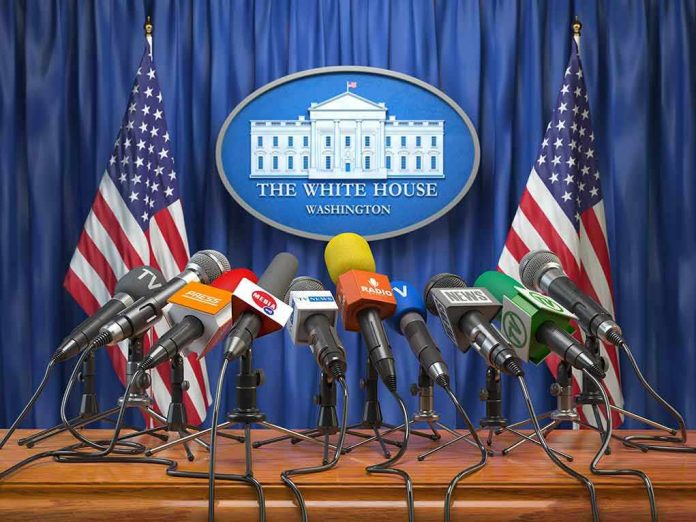
White House Press Secretary Karoline Leavitt delivered a scathing rebuke to 58 House Democrats who voted against a symbolic resolution honoring Charlie Kirk, exposing the left’s shocking hostility toward recognizing conservative voices in American political discourse.
Story Highlights
- 58 House Democrats voted against resolution honoring Turning Point USA founder Charlie Kirk
- White House Press Secretary condemns Democratic opposition as “affront to free speech and youth engagement”
- Resolution passed despite Democratic resistance, highlighting deep partisan divisions
- Conservative activists view vote as evidence of left’s intolerance for conservative viewpoints
White House Delivers Strong Condemnation
Press Secretary Karoline Leavitt forcefully criticized the 58 House Democrats who opposed the congressional resolution recognizing Charlie Kirk’s contributions to political discourse and youth engagement. Leavitt characterized their votes as “an affront to free speech and youth engagement,” emphasizing that the resolution represented “a simple gesture of human decency.” The White House’s direct condemnation of specific lawmakers represents an unusually strong response for what was intended as a ceremonial resolution.
Kirk’s Impact on Conservative Youth Movement
Charlie Kirk founded Turning Point USA in 2012, transforming it into one of America’s most influential conservative youth organizations. The 31-year-old activist has mobilized thousands of young conservatives across college campuses, championing free speech principles and traditional American values. Kirk’s organization has become instrumental in countering leftist indoctrination on university campuses, providing a platform for conservative students to express their beliefs without fear of academic or social persecution.
Democratic Resistance Reveals Partisan Intolerance
The Democratic opposition to honoring Kirk exposes the party’s growing intolerance toward conservative voices and free speech advocacy. Representative Alexandria Ocasio-Cortez and other progressive lawmakers justified their votes by claiming that honoring Kirk would “legitimize hate speech and division.” This rationale demonstrates how Democrats increasingly label mainstream conservative viewpoints as extremist rhetoric, undermining the fundamental principle that political discourse should welcome diverse perspectives rather than silence opposing voices.
The vote reflects a troubling pattern where Democrats consistently oppose recognition of conservative figures while eagerly supporting similar honors for progressive activists. This double standard reveals the left’s systematic effort to delegitimize conservative voices in American political life, treating traditional values and constitutional principles as dangerous ideologies rather than legitimate political positions worthy of respect and consideration.
Broader Implications for Political Discourse
The controversy surrounding this symbolic resolution highlights the erosion of bipartisan cooperation on even ceremonial matters in Congress. Historical precedent shows that congressional resolutions honoring public figures typically receive broad support regardless of political affiliation, yet Democrats’ organized opposition to Kirk demonstrates how partisan divisions now extend to previously non-controversial proceedings. This escalation threatens the basic civility that once characterized American political institutions.
Conservative activists view the Democratic votes as validation of their concerns about institutional bias against traditional American values. The incident reinforces arguments that progressives seek to marginalize conservative voices through systematic exclusion from mainstream recognition, treating constitutional advocacy and traditional principles as threats rather than legitimate political positions deserving equal consideration in public discourse.
Sources:
White House Condemns the 58 House Democrats Who Voted Against Honoring Charlie Kirk
House Democrats Split on Resolution Honoring Conservative Activist
White House Slams Democrats Over Kirk Vote
Controversy Over Congressional Honors Reflects Deepening Partisanship




